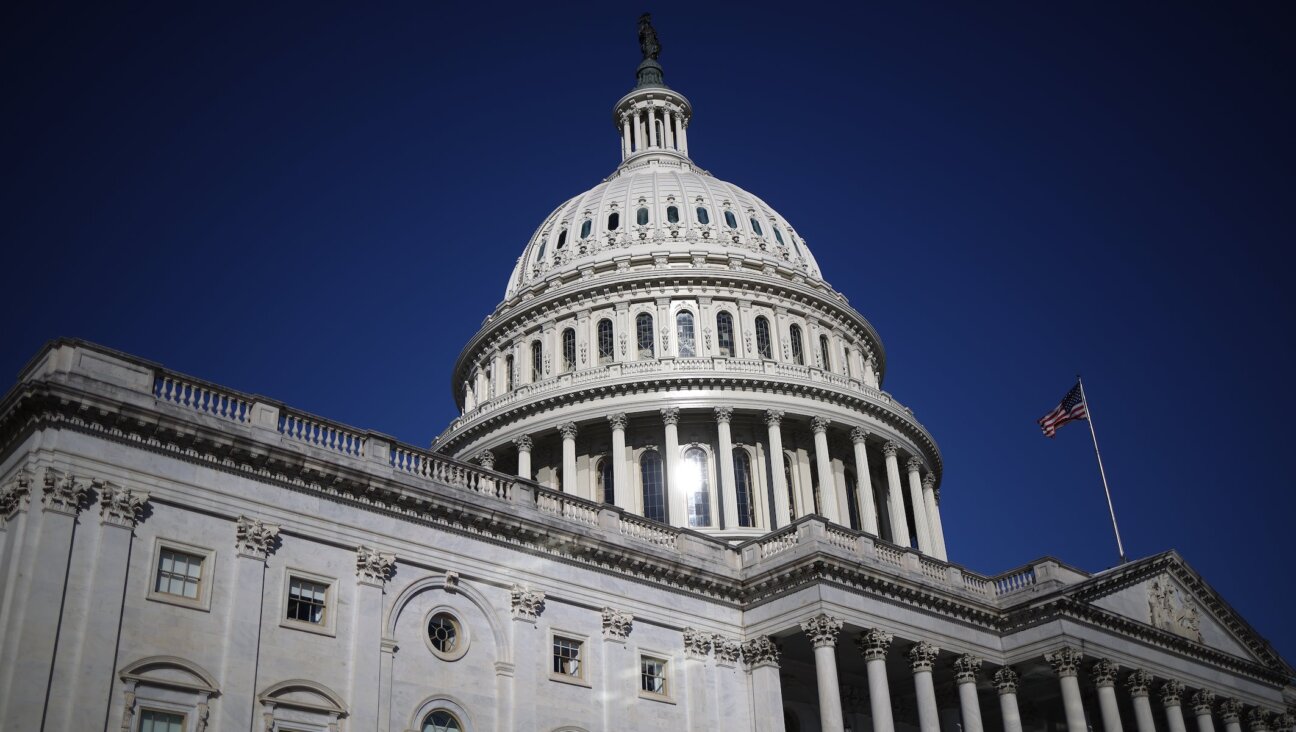Chuck Schumer’s ‘Original Sin’: Why he protected Joe Biden — until he couldn’t
‘Original Sin,’ a new tell-all book, details Schumer’s struggle and Antony Blinken’s quiet diplomacy before Biden’s 2024 withdrawal

Sen. Chuck Schumer and President Joe Biden on May 20, 2024. Photo by Samuel Corum/Sipa/Bloomberg via Getty Images
Chuck Schumer protected Joe Biden until he no longer could. Then they had a meeting that ended with a man hug, followed by tears.
Schumer told his old friend it was time to give up; Biden said he would think about it for a week.
Eight days later, Biden made his history-making decision: He would drop out of the race for the presidency.
The revelations about the July 2024 meeting between Schumer, the Jewish Democrat from New York who was then the Senate majority leader, and Biden are in a new book about the former president’s decline in health.
Schumer, the highest-ranking Jewish elected official in U.S. history and Biden’s longtime close ally, has drawn scrutiny for the revelations in Original Sin: President Biden’s Decline, Its Cover-Up, and His Disastrous Choice to Run Again.
The tell-all published Tuesday, sending shockwaves through Washington, is by veteran CNN anchor Jake Tapper and Axios political reporter Alex Thompson. Just before the release, Biden announced that he has Stage 4 prostate cancer.
In public ahead of the pivotal July meeting last year, Schumer, who had shepherded through Biden’s signature legislative achievements, said that he was not worried about Biden’s acuity.
In private, according to the book, Schumer acknowledged that at times Biden would call him and forget why he had called or had rambled and forgotten names. Schumer told confidants he had concerns about Biden’s chances even before what turned out to be the president’s disastrous performance in the televised debate with Donald Trump on June 27, 2024.
Schumer, the authors wrote, urged anxious Democratic senators to keep their doubts about Biden private, fearing that public pressure would only deepen the crisis. “I know this guy,” Schumer told them. “If we do something public, he will get his back up.”
Historically, Schumer had been reluctant to use his sway to convince colleagues to retire even when their failing health was obvious. In 2023, Dianne Feinstein, the long-serving Jewish senator from California, faced growing criticism for remaining in the Senate despite signs of cognitive decline, hospitalization, and missing key votes. Schumer never intervened and Feinstein died later that year.
Biden’s catastrophic debate performance was a bridge too far for Schumer, according to the book. As pressure mounted for Biden to withdraw, senior Biden advisers Michael Donilon and Steve Ricchetti asked Schumer for a list of lawmakers who needed reassurance. Schumer told them to start alphabetically — and call every single one.
Schumer initially advised Biden’s team to get the president to engage with people in unscripted moments as a way of assuaging concerns. “Schumer was starting to worry,” the authors wrote, that “maybe the reason why Biden wasn’t taking his advice was simply because he couldn’t.”
When his advice did not produce results, Schumer reportedly called White House Chief of Staff Jeff Zients demanding a meeting with the president. “If you don’t put something on the calendar, I will make the request publicly,” Schumer warned in a July 12 phone call. “And then you will have to give me the meeting, and it will be public.”
Schumer met with Biden the following day, July 13. In the meeting, he warned about the risk Biden’s apparent decline posed of losing to Trump, with Republicans regaining control of both the House and Senate — a scenario that ultimately came to pass. “You will go down in American history as one of the darkest figures,” Schumer told Biden. “Your chances of winning are only five percent.”
At the meeting’s end, Biden acknowledged Schumer’s boldness. He put his hands on Schumer’s shoulders and remarked, “You have bigger balls than anyone I’ve ever met.” On his car ride back home, Schumer “teared up” while relaying the conversation to his staff, according to the book.
On July 21, Biden withdrew from the presidential race.
Asked Tuesday about the revelations, Schumer would only tell CNN, “We’re just looking forward.”
The Biden family had dismissed the book as baseless gossip. His granddaughter, Naomi, said in a social media post on Monday that she had read the book and that it was “political fairy smut for the permanent, professional chattering class.”
Blinken’s quiet diplomacy

According to the book, then–Secretary of State Antony Blinken believed that Biden was “fully able to meet the moment” at the debate, particularly on foreign policy.
However, he recognized that Biden’s “inability to project energy at this juncture” meant he would struggle to convince viewers of the accomplishments that would otherwise define his legacy.
“This is not about today,” Blinken reportedly told Biden, urging him to consider the risk of defeat. “It is about when you’re 86.” Biden would have been 82 upon assuming a second term had he been reelected.
Blinken, one of Biden’s closest advisers for two decades, made a similar case a year earlier. In March 2023, he had “no concerns about Biden’s ability to do the job,” the authors wrote.
However, Blinken continued to press Biden to consider how he would feel in the years to come. “I’m with you 110 percent, whatever you want to do,” he told Biden. “But I want to make sure you want to take this on.”
Blinken had increasingly stood in for the president at dinners during overseas trips in the latter half of Biden’s term, a pattern that raised concerns among staff.
“Blinken would usually not find out he was replacing the president until the day of,” Tapper and Thompson wrote. Blinken also had to intervene during Biden’s meetings with foreign leaders “to remind him to talk about the crucial issue the meeting was meant to be about,” a former European leader recounted.

















